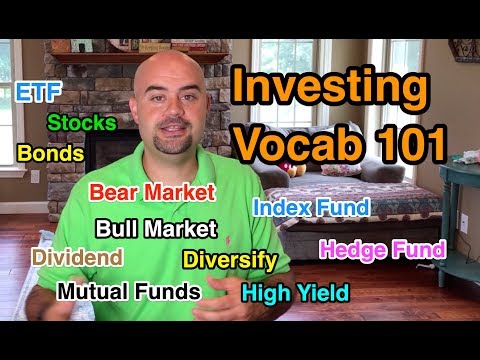#schoolofpersonalfinance #learnaboutmoney #personalfinance #moneybasics #financialfreedom
Basic Investing Vocab 101 – learn the basic terms here in this video. When people talk about investing they are usually referring to stocks, mutual funds, and exchange-traded funds (ETF’s). These products all play a very big role in our retirement plans. I believe this is a big problem because the average person has no idea what they are investing in, so they just do what someone they perceive to be better versed tells them to do. I will give a description of each product type below, but before I do here is the main takeaway from this page. Keep things very simple, very low cost, make very few changes and do not believe that you or an advisor can beat the market. This holds true if you are investing in a regular brokerage account, an IRA or an employer-sponsored retirement plan.
A stock is a share of ownership in a company. If you decide you like Google and want to buy its stock, you will actually own a very small percentage of Google and share in the growth of the business. The main reason companies issue stock to the public is to raise money. This is what makes the company a public company. The company will have an event called an Initial Public Offering (IPO) where they sell shares of the company on a major stock exchange in return for money. The owners of the company will no longer own 100% after the IPO. The public will now own a percentage of the company. For example, if you and I started a business and grew it to the point that we wanted to raise money from investors to grow even more, we could decide to sell shares of our business through an initial public offering. Individual investors would then be able to buy our stock on the exchanges and share in the growth of the company.
Purchasing individual stocks is usually not an option in employer-sponsored plans like 401k, 403b or 457 plans. Instead, the employer will hire a provider with a menu of mutual funds to choose from.
A Mutual Fund is a type of investment that pools money from investors to purchase individual stocks, bonds or other asset classes. When you purchase units in a mutual fund you are investing in a portfolio of individual securities that were selected by a professional money manager. Mutual Funds have a specific investment objective like growth or income.
The most important thing to look at with Mutual Funds are the fees. It may be hard to figure out how much fees you are paying, especially in an employer-sponsored retirement plan like a 401k or 403b plan. You want to look for the expense ratio. This is the percentage of your account value the mutual fund company is deducting to manage the fund. For example, if you have $10,000 in a mutual fund with a 1% expense ratio then it costs you $100 a year to hold that fund. This will significantly reduce the amount you accumulate over a long period of time. You can purchase low-cost index funds for a tenth of the cost.
Never ever pay a load (sales charge) to a financial advisor to purchase a Mutual Fund! You can buy a very low-cost index fund from Vanguard, Charles Schwab or Fidelity instead and save thousands upon thousands of dollars!
ETF stands for Exchange Traded Fund. ETF’s are a basket of securities similar to Mutual Funds, but they are traded on the major exchanges like individual stocks. So in a way they are like a hybrid of the two. ETF’s have become extremely popular over the last decade. There are ETF’s that track every conceivable asset class. For example, you can purchase a broad ETF’s that tracks the entire stock market or you can choose to drill down and purchase an ETF that only invests in Artifical Intelligence companies.
Similarly to Mutual Funds, you have to be aware of the expense ratio. ETF’s, for the most part, are very low- cost, but not always. A simple and low-cost way for the average person to invest is to purchase ETF’s that track an index like the S&P 500, the Total Stock Market index or the Total Bond Market index.
Subscribe Here: https://www.youtube.com/channel/UCJoM14_FRzdVAK4awLISSDA?sub_confirmation=1
Share this video with a friend:
Check out School of Personal Finance blog:
https://www.schoolofpersonalfinance.com/blog
★ CONNECT WITH RICH ON SOCIAL★
▸Twitter: https://twitter.com/richmccormack/
▸Instagram: https://www.instagram.com/richmccormack04/
▸Facebook: https://www.facebook.com/richmccormack
▸Linked In: https://www.linkedin.com/in/richard-mccormack/
To Becoming Great with Money,
Rich McCormack, CFP®


